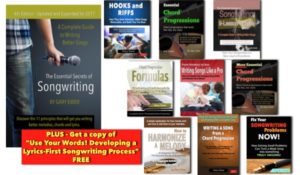Most people have little or no vocabulary when it comes to the structure of songs. The average person sitting in the local coffee shop listening to a song through their headphones wouldn’t know a bridge from a pre-chorus.
But interestingly, if you actually ask someone, even with little or no musical background, “Is this section you’re listening to right now a verse or a chorus?” — they most of the time can give you the correct answer. Even though they wouldn’t likely be able to tell you anything about why something sounds like a chorus, they just seem to know.
 “The Essential Secrets of Songwriting” 10-eBook bundle is being used by thousands of songwriters to take their writing technique to a professional level. It looks at every aspect of musical composition, from chords to melody to lyrics to song form, and more. It will make you a better songwriter – GUARANTEED.
“The Essential Secrets of Songwriting” 10-eBook bundle is being used by thousands of songwriters to take their writing technique to a professional level. It looks at every aspect of musical composition, from chords to melody to lyrics to song form, and more. It will make you a better songwriter – GUARANTEED.
The reason for this is more the result of a cultural response than anything else: songwriters in western cultures (N. America, Europe, etc.) have a common way of organizing the overall energy plan of a song such that verses start out in a lower ebb, building musical energy and momentum at the chorus. It’s done in several ways:
- Usually (though not always) moving the chorus melody higher.
- Making the chorus louder.
- Making the chorus chord progressions simpler and tonally stronger.
- Making the rhythms of the chorus hook simpler, creating a more powerful groove.
These are things listeners can hear, though most would not be able to verbalize those points. To most, a chorus simply sounds like a chorus.
Those four characteristics of song choruses are so common that you can use them as a kind of mini-checklist. If you find that you’ve written a song that just seems to be lack-lustre or otherwise lacking in drawing power, I can almost guarantee that one or more of the four items in that list are lacking.
The Musical Energy of the Verse and Chorus — It’s Relative
Because we know that a chorus needs to be more energetic than a verse, the temptation is to always look at the chorus as the problem if a song is lacking power. But song energy is a relative quality. Sometimes, the problem is not the chorus — it’s the verse.
In other words, it may be that your chorus is just fine, and needs little or no fixing, but the verse itself might be upstaging the chorus. Here’s how that can happen:
- The verse is too hook-driven. If your song launches into a great, repetitive hook, it can actually frustrate listeners to abandon that hook when the chorus comes. The solution: Try writing a new verse melody that keeps things a bit lower-key, and use that hook for the chorus of a different song.
- The verse is too powerful. This should be easy to fix at the production stage. Simply pare the instrumentation down, rely a bit more on implied chords rather than full ones. Also, try a high-energy intro that then moves to a quieter verse. The intro makes the listener feel that higher energy is going to return in the chorus, and that kind of expectation works really well in the pop genres. “Smells Like Teen Spirit” (Nirvana) is a great example of this.
- The verse melody is too high. The human voice exudes more energy the higher it goes. So you may be trying to keep things a bit calmer, but the high vocal range might be making that difficult or impossible. One solution is to move the song down by a tone or even more. That of course will result in a lower chorus as well, but you can deal with that: build up a more powerful production/instrumentation for the chorus when you get there, or sing the chorus an octave higher than you were planning.
- The verse makes too much use of vocal harmonies. If you’re a good singer, with access to good backing singers, you might be tempted to use vocal harmonies everywhere. That can compromise the energy of your chorus, so the easy solution is to simplify — or even eliminate — vocal harmonies in the verse, and use them more creatively in the chorus.
- The verse lyric is too descriptive of emotions, lacking a story. If you start your verse by telling everyone how you’re feeling, you’ve just upstaged your chorus. A verse needs to set the scene, describing people and circumstances so that when you finally reach the chorus, you’ve given listeners enough of a backstory that emotions have a place. All emotion all the time simply dulls its own effect.
Take a look at your most recent songs, and if you find that a lagging chorus is compromising the overall affect of your song, play the chorus by itself, and see if you like what you hear. If the chorus sounds fine, it’s time to look at the verse as the possible culprit.
 Written by Gary Ewer. Follow on Twitter.
Written by Gary Ewer. Follow on Twitter.
 “Fix Your Songwriting Problems – NOW!” shows you the most common songwriting mistakes that practically every songwriter has made at some point, with solutions you can apply to fix those problems. Get it separately, or as part of “The Essential Secrets of Songwriting” 10-eBook Bundle.
“Fix Your Songwriting Problems – NOW!” shows you the most common songwriting mistakes that practically every songwriter has made at some point, with solutions you can apply to fix those problems. Get it separately, or as part of “The Essential Secrets of Songwriting” 10-eBook Bundle.











Also it goes without saying, but I will , Professor Gary Ewer is one
of the best Song Writing Teachers around , I have known of Gary for
fifteen years plus and his E Books are some of the best I have ever read
I rate him up their with Tunesmith Jimmy Web who’s book of the same name
has been invaluable to an old dog like me who has been in the business for
Fifty plus years
Thanks very much, Peter, for those kind words. Very much appreciated!
-Gary
Songs that use lots of Harmony tend to be Love Songs
Soul and R and B Songs in general, need a powerful front man
with a little grit or huskiness in the vocals
Sex Bomb as sung by Tom Jones an ideal song for someone like Tom
Who uses a Mini Orchestra on his live performances and recordings
If you are writing these type of songs with a view of getting a Top class
singer to record it make sure your Demo Vocalist can handle it;
I say this because far too many song writers who have below average
voices , seem to think it does not matter , It does matter but make sure
your song is finished As a publisher I get far too many Demos , where
the writers truly believe they are the next Lennon and Mc Cartney, when in
fact their songs can often be below average and , rejected within a couple of
lines , I dont want to sound like a Know It All , but believe me , Song
Writing is an art, that has to be learned , by real hard work and listening to honest
and helpful critiques .